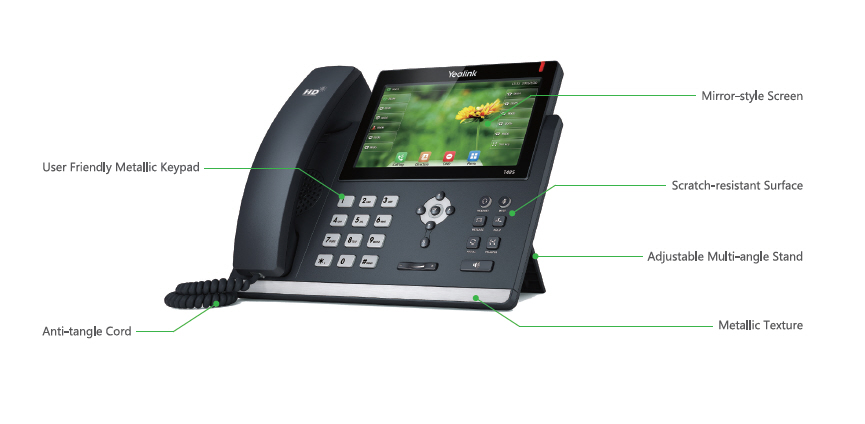Introduction
In today’s fast-paced business environment, communication is key. The advent of Voice over Internet Protocol (VoIP) has revolutionized how businesses operate, offering flexibility, scalability, and cost savings. As organizations increasingly turn to VoIP phone systems for their communication needs, understanding the features and functionalities that differentiate these systems becomes paramount. This article delves into what you should look for when choosing a VoIP phone system, guiding you through the myriad options available in the market.

What is a VoIP Phone System?
VoIP stands for Voice over Internet Protocol. It refers to a technology that allows users to make voice calls using the internet instead of traditional telephone lines. A VoIP phone system converts your voice into digital signals and transmits them over the internet, making it possible to communicate with anyone globally at greatly reduced costs.
How Does a VoIP Phone Work?
A typical VoIP phone setup includes:
- VoIP Phones: These can be hardware-based devices or software applications (softphones) installed on computers or mobile devices. Internet Connection: A stable and high-speed internet connection is critical for quality voice transmission. VoIP Service Provider: Businesses subscribe to a service provider that offers the necessary infrastructure and services for making VoIP calls.
Benefits of Using a VoIP Phone System
Cost Efficiency:- Significantly lower calling costs compared to traditional landlines. Reduced maintenance fees as most services are cloud-based.
- Easily add or remove lines as your business grows or shrinks. Adaptable plans based on your specific communication needs.
- Advanced functionality such as video conferencing, voicemail-to-email transcription, call forwarding, and more.
- Make and receive calls from anywhere with an internet connection. Ideal for remote workforces or businesses with multiple locations.
From Features to Functionality: What to Look for in a VoIP Phone System
When selecting a VoIP phone system, you need to balance features with practical functionality. Here’s what you should consider:
1. Call Quality
Call quality is non-negotiable when it comes to communication systems. Look for:
- High Definition (HD) Voice: Ensures clear audio without distortion. Quality of Service (QoS): Prioritizes voice traffic over other types of data on your network.
2. Reliability
A reliable system prevents downtime:
- Uptime Guarantees: Choose providers that offer uptime guarantees (99% or above). Redundancy Options: Systems with backup solutions ensure continued service during outages.
3. Essential Features
Different businesses have different needs; however, here are some essential features you shouldn’t overlook:
- Auto Attendant Call Recording Voicemail-to-Email
These features streamline operations and improve customer experience.

4. Advanced Features
Consider if advanced features will benefit your organization:
- Video Conferencing Capabilities Integration with CRM Systems
If collaboration is crucial for your team, these functionalities can enhance productivity significantly.
5. User Interface and Ease of Use
An intuitive user interface reduces training time and increases adoption rates among employees:
- Look for dashboards that are easy to navigate. Consider systems that allow customization based on user preferences.
Choosing Between Hosted vs On-Premises VoIP Systems
Should I choose a hosted solution or an on-premises setup?
This decision hinges on several factors including budget, technical expertise, and business needs:
Hosted VoIP Solutions
Advantages:
- Low initial investment since equipment is housed off-site. Automatic updates and maintenance managed by the service provider.
Disadvantages:
- Limited control over the hardware infrastructure.
On-Premises VoIP Solutions
Advantages:
- Greater control over data security and privacy.
Disadvantages:
- Higher upfront costs due to hardware purchase and installation.
Security Features in a VoIP Phone System
With increased cyber threats, ensuring the security of communications cannot be overlooked:
1. Encryption
Look for systems that offer end-to-end encryption to protect sensitive information during transmission.
2. Secure Authentication
Multi-factor authentication adds an extra layer of security against unauthorized access.
FAQs About VoIP Phone Systems
Q1: What are the main advantages of using a VoIP phone system?
A1: The primary benefits include cost savings on calls, increased mobility, scalability options, access to advanced features like video conferencing, and improved call quality.
Q2: Do I need special equipment for a VoIP phone system?
A2: While some businesses use dedicated VoIP phones (hardware), others utilize softphones installed on computers or smartphones. All you need is a stable internet connection!
Q3: Is there any downtime associated with switching from traditional phones to VoIP?
A3: Generally speaking, switching can be seamless; however, some downtime may occur during setup—especially if you're migrating large amounts of data or integrating existing systems.
Q4: Can I keep my existing phone number if I switch to a VoIP service?
A4: Yes! Most providers offer Number Portability services allowing you to retain your current number while transitioning to their platform.
Q5: Are there any hidden fees associated with using a VoIP service?
A5: Always read terms carefully as some providers might charge additional fees like installation charges or premium feature access fees.
Conclusion
Selecting the right VoIP phone system involves careful consideration beyond just features—it requires understanding how those features translate into functionality within your specific business context. With advancements in technology continually reshaping communication solutions, prioritizing elements like call quality, reliability, essential functions versus advanced capabilities will help ensure you’re making an informed choice tailored https://zenwriting.net/marachcszy/pbx-limitations-how-voip-phone-systems-break-the-mold precisely for your operational needs.
In summary, whether you're seeking mobility through cloud-based solutions or stringent control via on-premises installations, knowing what you're looking for in terms of both features and functionality will set you up for successful communications using your new VoIP Phone System.